Imperial-Bedienung
Imperial (Originalregel)
Manual for Imperial's interface.
This manual is for players who already know Imperial but just want to learn the interface of BSW. The complete rules can be read here.
The illustrations in this manual are in German. Online, the entire game can also be played in Dutch!
Unterschiede zwischen Imperial und Imperial 2030
Die wesentlichen Regelunterschiede zwischen Imperial und Imperial 2030 zusammenhängend hier aufgeführt.
And as mentioned earlier, there is also a manual for just the interface.
Parts
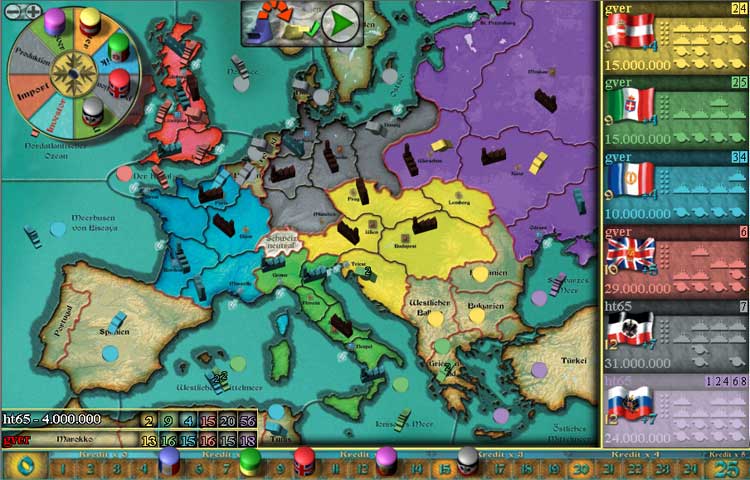
In addition to the map of Europe, you will see the following components on the screen:
Disk
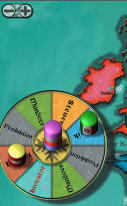
The central element to choose the actions from. Just click on the desired field and the corresponding action will be chosen. You can click in the middle of the disk and then drag it.
Player overview.


Here is shown the total amount of credit each player has provided per country. The investor is highlighted in red and for the player whose turn it is a */ If you hover the mouse over the summary you can see for each player how much interest income they are entitled to. If you click on the overview the position changes from bottom left to bottom right or back..
Country information
The countries are shown in the playing order at the right edge of the screen. For each country, the following information is displayed:

- Regional player in that country and the credits provided for it .
- Tax revenue and profit points
- State treasury
- Units in stock
The active country is indicated by a light border, in addition the ruling player is indicated here by >>name<<.
Detail information
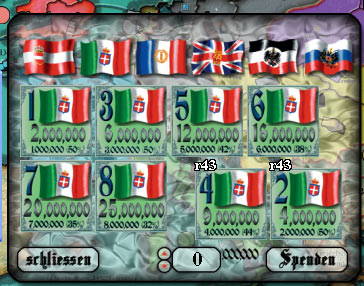
When you click on a country, a window with details opens. Here you can also donate money to a country, especially useful after choosing the action factory building or import.
Actions
Building Factory


In the factory phase all possible building sites for the factories are indicated by white "dummy" factories. By clicking on one of these you build the corresponding factory. If you do not want or cannot build a factory you can pass by clicking on the large X in the phase indication.
Production


Producing is started by clicking on the green arrow in the phase indicator. If you do not want to or cannot produce in all factories (e.g. because you do not have enough in stock) you can first click on the green V at the respective factory (it will then become a red X). By clicking again the factory is activated again.
Import


The possible places where you can import units are indicated in white. By clicking here a unit is placed in a lighter color. By clicking this one you can remove it again. To complete the import, click on the green arrow in the phase indicator.
Maneuver

Here you should note that after moving your fleets, you must explicitly click on the green arrow in the phase indicator to move your armies in the second phase (see also the rules).

After moving your armies you moth end the phase again with the green arrow. Now the tax chips will be placed automatically.
Move units.
You move units using drag-and-drop. You have to perform transports by sea and by rail step by step each time. For example, if you want to move your army from Munich to Norway, you have to drag it first to Cologne, then to Hamburg, then to the convoy on the North Sea and finally to Norway.
The units of the same kind are grouped, with a number indicating how many of them there are. For units of the active country, the status is additionally indicated (for armies whether they have already been moved, for fleets whether they have been moved and/or they have functioned as a convoy). For example, 4 (2,1) means that there are 4 fleets, 2 of which have already been moved and 1 of which has functioned as a convoy.
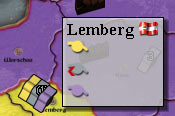
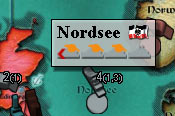
If you move the mouse over a country you will see detailed information about the units present there. Units that have already moved in this turn are indicated with a red arrow. Fleets that have acted as a convoy have orange artillery.
Convoyed
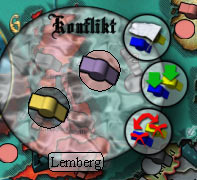
If you move to a region that already contains units of another country and/or to a province of another country, the conflict window is displayed. If you want to fight units without moving them, you can "move" your unit to the current region. If there are units from another country in that country, the conflict window is also shown. Then you can select one of the other country's units and then use the bottom red button to remove both units. If you don't want to fight, click the middle green button. The top button is only available if you have moved to a province of another country, with this button you indicate that you are a friendly army.
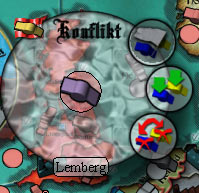
If the active country has chosen not to fight, all units of the other countries are asked (using the same window) whether or not they wish to do so. The upper left corner of the window indicates which type of unit of which country is currently being asked..
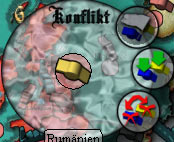
If one of another nation's units wants to fight, it is immediately executed. On the other hand, the player who placed his unit must always first choose which unit to attack (even if r only 1 is present).
Entrance provinces of other superpowers
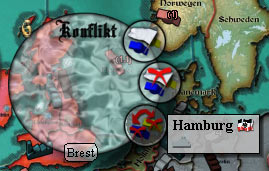
If you move into a province of another country where there are no units of that country, you can use the white flag to indicate that you are placing a friendly unit. This button is only active when you enter a province of and other country. The middle button (crossed out flag) indicates that you are placing an enemy army. If you want to change the status of a unit without moving it you must "move" the unit to the same province. However, if this major has only one active factory which is not occupied by enemy units then that particular province may not be occupied by enemy units. The unit will then automatically receive friendly status.

Friendly units are indicated by a white flag.
Destruction
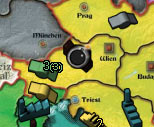
A factory of another country can be destroyed by clicking on the bomb symbol. This symbol is only visible if the conditions for destruction are met.
Investor

The money flows caused by this action are visualized. The investor (and then any players who do not rule countries) can then make credits in the new window that is displayed.

To choose a credit you can first click on the desired credit and then on the buy button (kaufen). If you want to raise a credit, you must first click on the new credit and an already issued credit and then click on the raise button (aufstocken).
At the end of this action it will be seen if it comes to government changes. The determining factor is the total of all credits a player has given to a state. If another player has given the most credits (not in a tie) to a nation, then he controls the government of that nation from that point on. If the government changes from a superpower that has only 0 power points left and loses its last government because of this the player in question receives 1 million from the player who takes over the government. If this player cannot pay it, he is not allowed to give the credit.
Tax

This action is performed automatically in three steps. Money flows are visualized, profit points are credited, and values for tax revenue and points are updated with the country.
Manual
Back to the manual.

